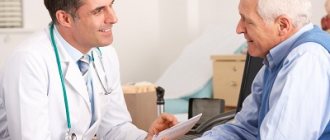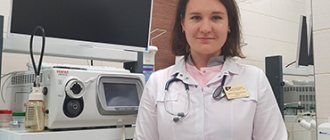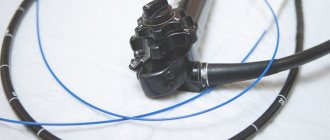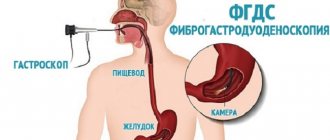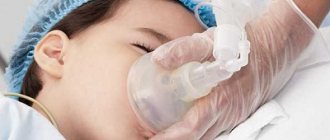If a patient complains about the digestive system, the gastroenterologist prescribes various diagnostic techniques that help identify the cause and make the correct diagnosis. A fairly common and effective procedure in this case is FGDS.
Fibrogastroduodenoscopy is a direct visualization method that allows you to assess the condition of the mucous membrane of the stomach, esophagus, and intestines. The examination is carried out using an endoscope. This device is a thin tube with a built-in camera. For adults, a tube with a diameter of about 1 cm is used, for children the diameter is smaller. On the monitor, the doctor sees the condition of the tissues, the presence of inflammation, neoplasms, and damage. The equipment also allows for treatment and collection of biomaterials for study in the laboratory.
Indications for FGDS
Examination and treatment of the stomach and duodenum using endoscopic equipment is prescribed:
- For abdominal pain that is regular.
- In case of discomfort and heaviness in the abdomen.
- For heartburn that does not go away for a long time.
- For anemia.
- In case of nausea and vomiting for a long time.
- When belching occurs.
- For problems with appetite.
- With sudden weight loss.
- For diseases of the liver, gall bladder.
- Before preparing for surgical interventions.
- To exclude ulcers, cancer, gastritis.
The examination is also recommended for chronic gastrointestinal diseases, to assess the effectiveness of the treatment, and to prepare the patient before a number of surgical interventions.
Why can't you smoke before an FGD? – Website about
Smoking often causes serious, even fatal illnesses. According to statistics, every year a bad habit claims the lives of millions of people around the world. When nicotine enters the human body, it disrupts the functioning of biological systems, causing health to deteriorate sharply.
The toxic substances that make up tobacco smoke negatively affect the gastrointestinal tract, so patients are often prescribed a procedure such as FGDS. You definitely need to prepare for it in order to experience a minimum of discomfort and get a clear picture of the study.
How cigarettes affect the gastrointestinal tract
Inhaled toxic smoke increases the permeability of blood vessels, which can lead to bleeding. In addition, nicotine irritates the gastric mucosa, causing increased production of gastric mucus, which is released for several hours after smoking.
Mucus and gastric juice complicate the research process. It is difficult for a doctor to identify a tumor, ulcer, erosion or find lesions of the mucous membrane. It is better for a person not to smoke on the day of FGDS in order to avoid discomfort, which is sure to intensify even after one cigarette.
What is FGDS and FGS?
Fibrogastroduodenoscopy (FGDS or EGDS) and fibrogastroendoscopy (FGS) are two reliable methods for studying the organs of the gastrointestinal tract. They are performed under local anesthesia, but the procedures are unpleasant. A person definitely needs to prepare for the result to be correct. The main requirement of doctors is a clean stomach and duodenum.
Both procedures differ only in the amount of work performed, but the preparation is always the same.
General recommendations:
- Breakfast before the study is prohibited, only early dinner is allowed,
- before the procedure, you should not eat foods that may remain in the folds of the stomach (the doctor will provide a detailed list),
- 3-4 hours before the start of the study, it is advisable to drink plain water so that the mucous membranes are cleansed,
- It is better not to smoke several hours before the FGDS.
Important! Anesthesia lasts about 3 hours after the examination. All this time, the patient feels numbness in the tongue and throat. During this period, smoking, eating and drinking are prohibited.
Also, before the procedure, you should not take medications in the form of capsules and tablets; their presence in the stomach distorts the results. Gastroscopy causes a strong gag reflex, which causes the contents of the stomach to quickly come out.
The patient may easily choke on vomit when inhaling air. It is for this reason that taking medications is prohibited.
Some drugs provoke active production of gastric juice, which aggravates existing gastritis or ulcers, which can lead to bleeding.
Smoking is unacceptable for the same reason, since nicotine also causes gastric juice to be produced.
How is gastroscopy performed?
To avoid complications during the procedure, the patient must take care of clean breathing and gastric mucosa. FGDS begins with anesthesia, partial relief of the gag reflex and salivation. Next, the doctor’s actions are as follows:
- The patient lies on his left side and bends his knees slightly. The specialist inserts a mouthguard into the mouth to avoid involuntary clenching of the jaw,
- A gastroscope is inserted into the oral cavity, which is pushed into the esophagus,
- The probe gradually moves through the digestive tract so that the doctor can look at the condition of the mucous membrane and notice any abnormalities. At this moment the patient needs to be calm. This will make the procedure less painful and quicker.
The inside of the stomach is displayed on the monitor; if necessary, the doctor will take a photo or record a video. Thanks to special equipment, it is possible to take material for a biopsy without the patient feeling pain. After the inspection is completed, the device is slowly removed.
Why is it better not to smoke before the procedure?
Endoscopists claim that cigarettes stimulate contraction of the esophagus. Reflex contraction makes diagnosis difficult, and the patient will feel pain when moving the device. Many smokers suffer from coughing, so the urge to cough will cause a lot of discomfort. The doctor will need to be constantly distracted, which is why the procedure will take a long time.
How does a patient behave if he smoked before an FGDS?
Endoscopists are often asked why they should not smoke before the examination. Doctors strictly prohibit patients from inhaling tobacco smoke, since nicotine will definitely affect the patient’s behavior:
- Nausea and a gag reflex appear - the effect of premedication weakens due to smoking. The probe irritates the root of the tongue, which causes gagging. Sometimes they persist for a long time and interfere with the research,
- Smoking before gastroscopy of the stomach does not allow the patient to relax . Nicotine increases nervous tension, the esophagus reflexively contracts, so the probe passes painfully,
- A person breathes incorrectly - a patient who has smoked finds it difficult to breathe through the nose for a long time; a cough appears, which clears the lungs of nicotine tar. Uneven breathing and the urge to cough interfere with the examination and increase the patient’s discomfort,
- There is a high probability of injury - tension in the upper part of the digestive system, and contraction of the sphincters impair the passage of the apparatus. The inner walls and tissues are easily injured, and nicotine makes blood vessels brittle, which causes gastric bleeding.
Important! A person who has smoked is tense during an endoscopy. This greatly interferes with the specialist, so it is best not to smoke at all the day before the examination and for 4 hours after it. As a last resort, the patient should not inhale tobacco smoke for at least 3 hours before starting FGDS.
Additional recommendations
Esophagogastroduodenoscopy is always prescribed in advance so that the patient can prepare for it, both physically and mentally. It is necessary to facilitate nutrition and cleanse the stomach, which will function without failures.
Before the study you need:
- do not eat legumes, seeds, nuts, fatty meats, fast food, hot spices,
- limit the consumption of pastries, bread, chocolate, tea, coffee, pasta,
- It is advisable to eat kefir, yogurt, cottage cheese, fruits, vegetables, steamed or stewed,
- You should absolutely not drink alcohol.
Dinner before the procedure should consist of easily digestible food no later than 3-4 hours before bedtime. After this, you should not eat for 12 hours so that your stomach is completely empty.
If you strictly follow the doctor’s recommendations, gastroscopy will be quick, painless and correct.
Is it possible to smoke before gastroscopy of the stomach?
The gastroscopy technique is used for diagnostic and therapeutic purposes. Indications for the examination:
- pain in the abdominal area;
- nausea, vomiting for no apparent reason;
- frequent heartburn;
- suspicion of reflux, gastritis;
- to identify ulcers;
- bloody impurities in the stool;
- study of neoplasms;
- removal of benign tumors;
- administration of medications;
- the need to remove a foreign object;
- bacteriological examination of the mucous membrane.
Carrying out analyzes
Before endoscopy, the patient undergoes an electrocardiogram and donates blood for research:
- determination of group and Rh factor;
- general clinical tests;
- determination of the presence of antibodies to the immunodeficiency virus, hepatitis, syphilis.
If the patient is aware of the presence of allergic reactions to Lidocaine, Novocaine, it is necessary to inform the doctor.
Fgs and fgds what is the difference
The medical procedures of FGS and FGDS are somewhat different from each other. The choice of study depends on the preliminary diagnosis or suspicion of a certain disease of the gastrointestinal tract (gastrointestinal tract). The abbreviation of the studies is deciphered as follows:
- FGS - fibrogastroendoscopy;
- FGDS - fibrogastroduodenoscopy.
The first type of study is used to diagnose diseases of the stomach, the second - the stomach and the inner surface of the duodenum (duodenum). For the purity of the study, preparation for FGDS of the stomach is necessary, which does not require much effort, but is mandatory.
Preparation stages
In other cases, preparation for gastroscopy is carried out at home, carried out in several stages. At the first stage, 3 days before the examination, it is advisable to comply with the following requirements:
- Do not drink alcoholic and carbonated drinks with sugar, spicy, fatty foods.
- Limit physical activity.
- Take herbal infusions that have an anti-inflammatory effect.
- The day before gastroscopy, do not take medications that affect blood clotting or the acidity of gastric juice, for example, Omeprazole, Aspirin. A doctor's consultation is required.
Shortly before the procedure you need to:
- Do not eat 10-12 hours before the endoscopic examination.
- Do not smoke 3 hours before the start of gastroscopy; Nicotine will increase mucus production, making inspection difficult.
- It is advisable to wear clothes that do not restrict movement during the procedure.
If the procedure is carried out in the first half of the day, it is better to eat your last meal no later than 18.00-19.00. In the morning, the examination is carried out on an empty stomach.
Drink water 2-4 hours before the examination; if gastroscopy is scheduled for early morning, it is advisable to refrain from drinking. If the examination is performed with pH measurements, the patient should not brush his teeth or drink liquids at all.
On the evening before gastroscopy, it is advisable to stop taking medications if taking them is not associated with a risk to life.
When undergoing the study in the afternoon, you are allowed to have a light breakfast in the morning. The morning meal may include yogurt and herbal tea. Drinking liquid is allowed 2-4 hours before the procedure in a volume of no more than 0.1 liter; drinking coffee is prohibited.
Before gastroscopy, it is advisable to adhere to a diet that includes the following foods:
- boiled chicken meat;
- lean fish;
- oatmeal;
- light vegetable soups;
- cottage cheese, low-fat cheese;
- herbal infusions;
- mashed potatoes;
- boiled, fresh vegetables;
- egg omelet.
You should refrain from eating seeds, hard fatty cheese, nuts, mayonnaise, baked goods, chocolate, and canned foods.
The diet is especially indicated for people who have obvious disorders of the gastrointestinal tract.
What to carry
For gastroscopy you need to take things and documents:
- passport;
- results of blood tests, x-rays, ultrasound;
- outpatient card;
- insurance policy (if this is not a paid clinic);
- direction;
- shoe covers; you can take replacement shoes;
- clean towel, napkins.
What does FGDS of the stomach show?
Gastroscopy of the stomach can be prescribed to patients of any age and gender; there are no contraindications or restrictions for these parameters. The examination is carried out in a clinic or hospital, but does not require special placement in a hospital. The prescribed medical examination, namely FGDS of the stomach shows:
- stomach diseases: gastritis, peptic ulcer, hypersecretion, achylia, esophagitis, cancer or mechanical damage;
- diseases of the inner lining of the duodenum.
A procedure is carried out to identify changes in the listed organs, including possible ulcerations or neoplasms. Your attending physician must also inform you about how to prepare for an FGDS of the stomach.
Carrying out the procedure
How effective the gastroscopy procedure is is shown by its popularity. Now these manipulations are actively used to identify ulcers, polyps and other serious problems with the digestive system. Many doctors turn to the procedure at the stage of identifying a disease in a patient in order to prescribe the correct treatment.
However, it is better to do gastroscopy wisely, remembering what is necessary:
- follow a special daily diet in the period before gastroscopy;
- numb the throat before starting manipulations;
- give up alcohol and smoking at least 24 hours before the procedure;
- It is better to perform gastroscopy in the morning or evening to obtain the most accurate results.
Source: https://kak-vse-ustroeno.ru/zdorove/pochemu-nelzya-kurit-pered-fgds.html
Side effects
Typically, FGDS is well tolerated by patients, but sometimes after the procedure the following are noted:
- Feeling of bloating, fullness in the intestines.
- Pain in the stomach, lower abdomen.
- Sore sensation in the throat.
The discomfort goes away during the day; if necessary, you can take a drug with an antispasmodic effect.
If the symptoms have not gone away the next day, or there is an increase in temperature to 38°C or higher, sharp pain, stomach cramps, vomiting, diarrhea, then you should consult a doctor.
Tobacco smoking and alcoholic drinks
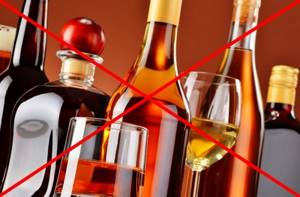
Alcoholic drinks must be avoided
A very important aspect of proper preparation for FGDS is to address the issue of smoking and drinking alcohol. As a rule, all doctors say that these things must be completely abandoned, however, if a person smokes constantly, then this is extremely difficult to do, and complete cessation of smoking is impossible. In this case, it is important for the patient to know how many hours before FGS he can smoke or drink alcohol.
Smoking before FGDS is prohibited, which is associated with the negative effect of nicotine on many physiological processes.
Is it possible to smoke before gastroscopy? It is believed that nicotine and other substances contained in tobacco smoke lead to the formation of excess mucus in the stomach, thereby making it difficult to examine the mucous membrane. Therefore, before FGDS, you should not smoke on the day of the examination itself, regardless of the time of its appointment. If the patient smoked yesterday or a few days ago, then it’s okay - no changes in the body last for such a long period.
Alcoholic drinks have a damaging and irritating effect on the mucous membrane of the gastrointestinal tract. In this regard, their use is prohibited one week before the scheduled gastroscopy.
It is impossible to conduct an adequate gastroscopy for a person who has smoked or taken alcohol. Therefore, the examination must be rescheduled.
Possibilities of FGDS
During the examination, the doctor assesses the condition of the mucous membranes of the stomach, esophagus, and duodenum. Foci of inflammation, tissue ulceration, and neoplasms are clearly visualized on the screen.
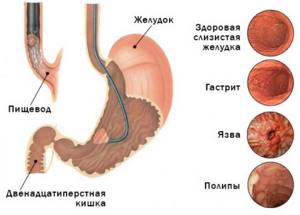
In addition, during the procedure you can:
- Remove the foreign object from the stomach.
- Get rid of benign formations.
- Perform a biopsy.
- Administer the necessary medications.
- Stop bleeding in the stomach.
Preparation
Preparation for EGD of the stomach begins several days before the procedure. Compliance with the recommendations will make diagnostic measures more informative, help conduct research without visualization difficulties and accurately identify possible pathologies.
Detailed information about preparation is provided to the patient by the gastroenterologist at the preliminary consultation. General recommendations are given below.
3 days before the test
Three days before the examination, it is recommended to exclude the following products from the menu:
- Seeds, nuts, legumes.
- Spicy, smoked, salty foods.
- Fried, fatty foods, mayonnaise.
- Carbonated drinks, alcohol, juices.
- Chocolate, coffee, ice cream.
- Baked goods made from wheat flour.
- Fruits and vegetables rich in fiber: cabbage, radishes, raw carrots. It is also not recommended to eat plums, apricots, tomatoes, and beets.
- Dairy products.
Preparation for FGDS is based on a diet that includes:
- Boiled or baked meat and vegetables.
- Rice, buckwheat, oatmeal porridge with water.
- Steam omelette.
- Crackers, dryers, biscuits.
- Compotes, jelly.
If the patient takes medications as part of the treatment of chronic diseases, the course of treatment is not interrupted, all recommendations are followed as prescribed.
It is advisable for the patient to quit smoking during the preparation period. Nicotine increases the intensity of gastric juice production, exacerbates the feeling of hunger, worsens the condition of blood vessels, causes spasms, and increases the urge to vomit.
Preparation for the examination also implies stabilization of the patient's chronic diseases. This applies to hypertension, diabetes, cardiovascular pathologies and other diseases that require constant treatment. During periods of exacerbation, the procedure is not performed. All prescriptions must be mentioned to the gastroenterologist at the consultation before FGDS of the stomach.
The day before the procedure
The study is carried out on an empty stomach. The last meal is allowed no later than 8 hours before FGDS. This should be a light dinner. If the patient has digestive problems, then at least 12 hours should pass from dinner to the examination.
Patients with diabetes are allowed to drink sweet water or tea as needed, but no later than 5 hours before the procedure.
If there is a tendency to bloating or difficulty with bowel movements, then preparation for the procedure includes taking carminatives and cleansing the intestines with an enema or laxative. The patient must also notify the doctor about this.
On the day of the FGDS
- If the study is scheduled for the first half of the day, then you are not allowed to have breakfast, drink drinks or water. If you spend the afternoon, you can drink sweet tea in the morning.
- If the patient receives medications in the form of tablets and capsules, then, if possible, their intake is postponed until after the procedure. If medications that need to be absorbed or injections are used for therapy, then they are taken as usual. You must be informed about all medications taken before starting the study.
- No smoking.
It is recommended to wear loose-fitting clothing, without putting pressure on the abdomen and stomach. It is better to leave the neck free.
How many hours before the procedure?
Before endoscopic examination of the digestive organs, patients often experience extreme thirst.
However, immediately before diagnosis (at least 1 hour before insertion of the probe), drinking any liquids is prohibited. If the procedure is carried out around noon, you can and even need to drink water in the morning. This will help suppress the hunger associated with the need to perform the procedure on an empty stomach.
Proper drinking regimen includes the following recommendations:
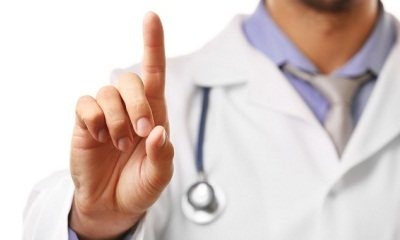
You can drink warm, clean water for the last time before the test 1-2 hours before the time prescribed by the doctor.- The longer the period that the patient can withstand without water before FGDS, the more reliable the endoscopy data.
- If the thirst becomes unbearable, you can rinse your mouth with clean water and spit it out.
If it was not possible to maintain a drinking break before FGDS, the procedure will have to be postponed. If the time interval is observed, the liquid will not affect the diagnostic results in any way.
How is it carried out?
- The examination is carried out in a lying position on the left side.
- Patients using dentures need to free the oral cavity from foreign objects.
- Before the examination begins, the throat is irrigated with a local anesthetic. This reduces sensitivity and helps weaken the gag reflex.
- When the anesthetic begins to take effect, a clamp is inserted into the mouth, which prevents the jaw from accidentally closing.
- The doctor places the end of the endoscope at the root of the tongue and asks the patient to swallow. This way the tube enters the esophagus and moves along it. This is the most unpleasant moment of the procedure; then the feeling of discomfort goes away.
- The duration of the diagnostic test is about 15 minutes. If it is planned to take a biopsy, administer medications, or remove formations, then the time for performing an FGDS increases to half an hour.
Fibrogastroduodenoscopy under sedation
To reduce discomfort in the patient and during upcoming long-term manipulations, FGDS can be performed with immersion in medicated sleep.
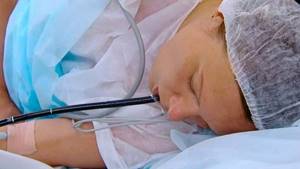
Also indications for sleep research are:
- Strong gag reflex.
- Psychomotor impairments that prevent you from remaining still during the examination.
- Patient's wishes.
Emergency EGD is not performed during sleep. The procedure is allowed for children from 7 years of age.
Preparing for such a test is different from preparing for a regular procedure. A consultation with an anesthesiologist and a number of tests are added.
Before the examination:
- A medical history is taken and a decision is made on the possibility of using a sedative.
- A general blood test, tests for HIV, hepatitis, and fluorography are performed.
Immediately before the procedure, the patient needs to remove jewelry and contact lenses. Next, the drug is administered, the patient falls asleep and the examination of the stomach begins.
Sleep time is calculated taking into account upcoming events. After waking up, you usually feel normal, without any significant discomfort. After 1 hour the patient is allowed to go home.
Is it possible to smoke before gastroscopy?
The number of people suffering from gastrointestinal pathologies increases every year.
During the hardware examination, they are prescribed fibrogastroduodenoscopy, which is one of the most informative diagnostic techniques.
Before the study, doctors must explain to patients how to properly prepare for the procedure, whether it is possible to smoke before gastroscopy, and how to eat.
articles
- Indications
- Contraindications
- Preparation
- Smoking before FGDS
Fibrogastroduodenoscopy is prescribed to patients if there are suspected pathologies occurring in the stomach and duodenum. Their list should be replenished:
- ulcerative and erosive lesions;
- hernias;
- esophagitis;
- bleeding localized in the upper digestive tract;
- neoplasms of various nature, etc.
FGDS of the stomach is a very informative technique that allows not only to diagnose pathology, but also to collect biological material for histological studies. If necessary, during the procedure, specialists can perform therapeutic measures using a gastroscope (a flexible hose equipped with a micro-camera).
Contraindications
Esophagogastroduodenoscopy is not performed on patients who have the following pathological conditions:
- acute gastrointestinal diseases occurring in a chronic form;
- strokes;
- mental disorders;
- heart attacks;
- hypertension, during a crisis;
- pathologies of the hematopoietic system;
- bronchial asthma during exacerbation;
- unconsciousness
It is prohibited to perform fibrogastroduodenoscopy on patients who have recently undergone surgery on the larynx..
Preparation
Before FGS, patients must undergo special training, thanks to which it will be possible to obtain the most accurate and informative results. The attending physician prescribes some tests for the patient in advance, for example, blood clotting tests. The day before visiting the physiotherapy room, you must begin to carry out the following manipulations:
- Within 2-3 days, you need to eliminate from your diet foods that contain unsaturated fats and simple carbohydrates. Sauces and fast food, milk in any form, fresh vegetables, alcohol-containing drinks and legumes are completely excluded.
- It is forbidden to eat food for at least 12 hours before the examination.
- Smoking is not recommended before gastroscopy of the stomach.
- Patients should not use medications that can cause blood thinning for two weeks.
- You should not drink drinks that can stain and leave a residue on the mucous membranes. This list is replenished with tea, juices, coffee, as well as any soda.
- On the day of the examination, the patient, if very thirsty, can drink half a glass of clean water.
Smoking before FGDS
For people suffering from nicotine addiction, some restrictions are introduced before zofagogastroduodenoscopy.
This is due to the fact that the tars present in cigarettes have a negative effect on blood vessels, in particular on their permeability.
If the patient smoked before the hardware examination, he may begin to bleed at the time of insertion of the flexible probe, even with minor trauma to the mucous membranes.
It is worth noting that in people who smoke, the stomach walls, under the influence of nicotine, begin to intensively generate mucus. This in turn may negatively affect the interpretation of study results.
Due to the cigarette smoked, the patient’s gag reflex increases at the time of insertion of the medical instrument. In some cases, for this reason, specialists have to interrupt the examination, since there is no possibility for unhindered advancement of the endoscope.
Many patients are interested not only in the technique of carrying out the diagnostic procedure, but also in preparatory aspects, for example, whether it is possible to smoke before FGDS.
As a rule, this question arises among people who have a persistent nicotine addiction, which they cannot get rid of without outside help.
Despite the fact that doctors do not impose a strict taboo regarding smoking, they strongly recommend that patients give up their addiction for a while.
Nicotine can cause unpleasant consequences during an endoscopic examination:
- An unwanted gag reflex will appear.
- A patient who smokes a cigarette before the procedure will not be able to relax.
- Breathing will be impaired, and a cough may occur due to the natural cleansing of nicotine tar from the lungs.
- The likelihood of injury to mucous membranes will increase.
Smokers, due to reflex narrowing of the esophagus during FGDS, experience pain when passing an endoscopic instrument.
Because of this, specialists have difficulties in the diagnostic process, and they are unable to perform a number of manipulations as accurately as possible:
- determine the extent of damage;
- assess the general condition of organs;
- choose the right place for a biopsy;
- identify reflux and other pathological changes.
For patients who cannot voluntarily give up their addiction, experts strongly recommend not smoking at least three hours before the endoscopic examination. If they ignore this requirement, the FSHD results may be distorted and ultimately they will have to undergo a hardware examination again.
Source: https://easymed-nn.ru/diagnostika/fgds/kurenie-pered-gastroskopiey.html
"VIP Academy": European standards of medicine
The multifunctional uses Japanese equipment. We carry out diagnostics, treatment procedures, biopsies with further study of samples in our laboratory.
Endoscopes have high resolution, which makes it possible to examine mucous membranes with several times magnification to detect pathological changes up to 1 millimeter in size. The results are recorded on digital media.
We have doctors with more than 10 years of experience who specialize, among other things, in working with children.
Based on the results of endoscopy, you can consult a gastroenterologist and undergo a course of treatment from leading specialists in Nizhny Novgorod.

